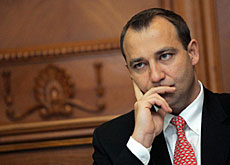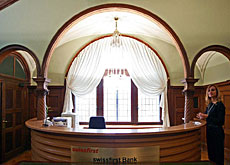Pension regulation falls under spotlight

Switzerland's pension fund industry has been advised to get its house in order with stricter self-regulation following the recent Swissfirst bank scandal.
The banking sector has questioned a perceived lack of control over the way pension fund managers conduct their business while experts fear a damaging amount of government red tape.
The dispute has erupted after the suspicious movement of shares just before the merger of Swissfirst and Bellevue banks in September of last year.
Several pension funds sold Swissfirst shares to the bank’s chief executive, Thomas Matter, leading up to the deal, sparking a criminal investigation when the news broke a few weeks ago.
A pension fund manager at Siemens Switzerland was then arrested and later released in Zurich.
Several banking organisations have been quick to highlight the difference between their heavily regulated sector and the comparatively laissez faire approach of the pensions industry.
“The pensions field is regulated with a code of conduct, but when you look at all the regulations for banks it is not quite as stringent,” Swiss Private Bankers Association secretary general Michel Dérobert told swissinfo.
“It is arguably more important with the handling of pension funds because this represents a vital necessity for people who have to live on this money when they retire. In wealth management [banking] we are talking about reinvesting the surpluses of wealthy people.
“Pension regulation is not as tightly or professionally run as in the banking sector. It would be wise to make sure at least the same standards apply in pension fund management.”
Code of conduct
Apart from a self-regulatory code of conduct, the pensions sector is also policed by the Federal Office for Social Security and individual cantonal authorities.
This system in itself is confusing, according to Ulrich Grete, president of the independent watchdog body, the Swiss Social Security Fund.
“Who does what between these two structures is not at all clear. There are also no clear standards to ensure the same supervisory system applies in each canton,” he told swissinfo.
“There are relatively lax cantons and relatively severe cantons and this is not as it should be.”
But both Dérobert and Grete are against tough new legislation imposed by a central government.
“Politicians have a habit of over-reacting to scandals. We want to avoid this over-reaction, but that does not mean we should do nothing at all,” said Dérobert.
Counter productive
Grete even wants a reduction of state interference, believing that existing legislation is rigid and counter productive. For him, it is key to set tighter guidelines about who should sit on the management board of pension funds and then let them get on with the job unhindered.
“Regulations imposed by the federal administration are generally too complex and are an obstacle to well managed organisations. These are politically motivated decisions, not business decisions,” he said.
“The fundamental issue that has not yet been properly tackled is to form a legal basis that governs the composition of the top level of management in these funds. They should be comprised of both employers and employees.”
Finance Minister Hans-Rudolph Merz has already hinted that the Swissfirst affair presents a case for tightening insider-trading laws.
But any government interference will be resisted by the umbrella organisation of the pension industry, which has repeatedly rejected centralised governance in favour of improvements in self-regulation.
“We do not need a centralised organisation enforcing laws onto us,” said Association of Pension Funds director, Hanspeter Konrad. “We do not operate like the banking or insurance industries.”
Konrad added that the organisation was looking at ways of strengthening the self-regulatory code of conduct.
swissinfo, Matthew Allen
Finance Minister Hans-Rudolph Merz has indicated that he will look into insider-trading rules.
The practice of front running is already illegal in Switzerland. This involves someone with knowledge of an impending deal buying or selling shares for themselves before doing the same business on behalf of the institution they represent.
Parallel running, however, is not forbidden. In this instance, personal and institutional business is conducted at the same time.
Swissfirst and Bellevue banks announced their merger on September 12, 2005. The previous month was marked by a surge in trading of Swissfirst stock, as several pension funds sold their stock to the bank’s chief executive.
These shares increased by 50% in value shortly after the merger was announced, but pension funds that sold saw none of these substantial gains.
Canton Zurich’s public prosecutor started criminal proceedings in August of this year against chief executive Thomas Matter and several pension fund managers. Matter resigned as Swissfirst chief executive on August 28.

In compliance with the JTI standards
More: SWI swissinfo.ch certified by the Journalism Trust Initiative













You can find an overview of ongoing debates with our journalists here . Please join us!
If you want to start a conversation about a topic raised in this article or want to report factual errors, email us at english@swissinfo.ch.